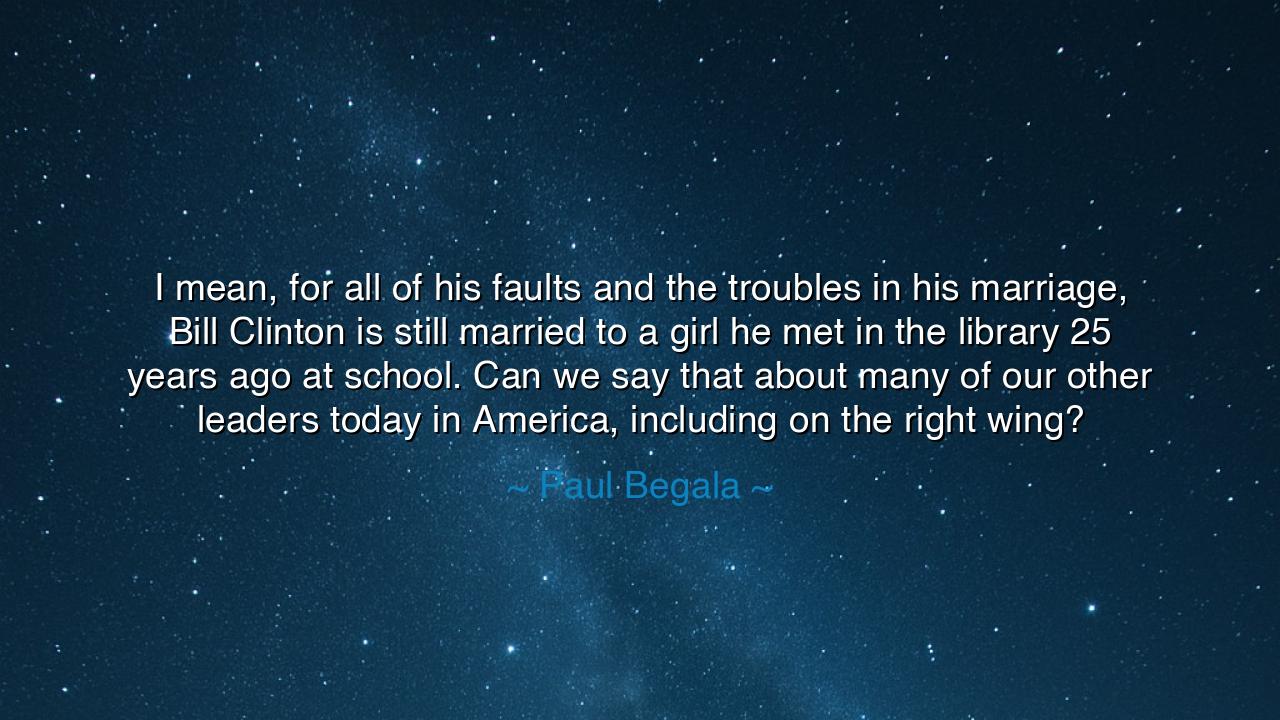
I mean, for all of his faults and the troubles in his marriage
I mean, for all of his faults and the troubles in his marriage, Bill Clinton is still married to a girl he met in the library 25 years ago at school. Can we say that about many of our other leaders today in America, including on the right wing?






When Paul Begala said, “I mean, for all of his faults and the troubles in his marriage, Bill Clinton is still married to a girl he met in the library 25 years ago at school. Can we say that about many of our other leaders today in America, including on the right wing?” he was not speaking merely of politics, nor of scandal — he was speaking of endurance, of human loyalty, and of the rare art of holding fast to love despite imperfection. His words carry the wisdom of one who has walked through the storms of public life and knows that character is not proven in moments of triumph, but in what endures after the thunder has passed. In this reflection, Begala draws our eyes away from the glitter of political power and turns them toward something humbler yet infinitely more revealing: the quiet, persistent faithfulness of two souls bound together through time.
The origin of this quote lies in the years following Bill and Hillary Clinton’s tumultuous period in the White House — a time when the world watched their marriage tested under the harshest light. To the public, the story was scandal; to Begala, it was something more profound. He, having served as a senior adviser to President Clinton, had seen up close both the man’s flaws and his humanity. In invoking the image of the young couple who met in the library of Yale Law School, Begala sought to remind the world that even in the midst of disgrace, there remained an enduring truth: that commitment, however strained, is still sacred when it survives the fires of life. His statement is not a defense of sin but a recognition of fidelity’s strength in a culture that too easily discards what no longer shines.
To understand his words, we must see the deeper philosophy behind them. In an age obsessed with perfection, Begala’s quote offers a paradox — that what makes love enduring is not purity, but perseverance. The ancients understood this. They spoke of constancy as a virtue greater than beauty or eloquence, for it is constancy that transforms affection into a lifelong covenant. In marriage, as in leadership, the truest test of character is not how one begins, but how one remains. The bond between Bill and Hillary, however turbulent, stands as a symbol of what is possible when two people choose to stay, to rebuild, to forgive. In this, Begala sees not hypocrisy, but human truth — that love, imperfect yet enduring, can still be honorable.
Throughout history, there have been unions that have endured against the currents of time and trial. Consider Franklin and Eleanor Roosevelt — a couple whose marriage was tested by infidelity, politics, and distance. Yet they never abandoned their shared purpose. Their partnership evolved into something greater than romance — a union of vision and will that transformed nations. So too with the Clintons: whatever private pain they bore, they continued to walk the same road, bound by shared ideals and a life’s work that transcended their wounds. This is what Begala points to when he contrasts their marriage with those of “other leaders.” He asks not who has been flawless, but who has been steadfast.
There is also in his statement an implicit critique of modern leadership — that many who preach virtue fail to live it in the intimate spaces of life. For what is leadership if not the extension of one’s private integrity into public service? The man or woman who cannot remain faithful to the bonds of trust within their own household cannot be trusted to guard the bonds of a nation. Begala’s words thus remind us that personal fidelity and moral discipline are not separate from public virtue; they are its very foundation. In this way, his praise of Clinton’s enduring marriage is not sentimental but philosophical — a reflection on the link between love, loyalty, and the moral fabric of society.
Yet Begala’s quote also holds a deeper compassion. He acknowledges Clinton’s “faults and troubles,” speaking not as a partisan but as a human being who knows that greatness and weakness often dwell in the same heart. This humility is essential to understanding his wisdom: he does not exalt imperfection, but he refuses to deny redemption. The ancients taught that the highest form of love is forgiveness, for it allows the broken to become whole again. What endures, then, is not the illusion of flawlessness, but the decision — again and again — to begin anew.
Let this truth be carried forward to future generations: commitment is a form of courage. To remain — when others flee, when comfort fades, when pride would rather destroy than forgive — this is the true heroism of love. Begala’s words invite us to honor not the glittering image of virtue, but the quiet work of faithfulness that survives through time and trial. In a world where many seek perfection, he calls us instead to seek perseverance. And so, as we look to our own lives and relationships, let us remember his wisdom: that strength lies not in the absence of weakness, but in the endurance of love despite it — for that, indeed, is the noblest form of victory.






AAdministratorAdministrator
Welcome, honored guests. Please leave a comment, we will respond soon